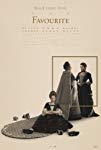Eye For Film >> Movies >> The Favourite (2018) Film Review
The Favourite
Reviewed by: Anne-Katrin Titze

The sounds of doves cooing and dogs panting set the tone before we even see The Favourite's first image, which is Queen Anne's (Olivia Colman) gigantic ermine train. Animals play a distinctive, well thought through part in this costume drama/ royal court farce, directed by Yorgos Lanthimos, the master of intricate displacements, wondrous horrors and unexpected bluntness.
What catches up with us around every dark corner turned, along each panelled palace gallery, or hidden among sumptuous flowers and embroidered walls, is the savagery and hideousness and self-disgust of those in power.

Not since Alain Renais's Last Year In Marienbad, or maybe Benoît Jacquot's Farewell My Queen, have corridors been so effectively and originally used. The spaces of the court of Queen Anne are resplendent with an enticing interplay of tapestries and paintings and furniture and unpredictable arrangements of food that at first sight merely provide a feast for the eyes of our Instagram saturated times.
"Did I lisp?" the Queen asks of her initial favourite, Lady Sarah (Rachel Weisz), who has a good grip on her sluggish monarch, body and soul. The arrival of Abigail (Emma Stone), a remote, impoverished relative of Sarah's, soon shifts the dynamics in the palace.
Cinderella, pre-clean up by the Brothers Grimm, not even to mention Disney, may come to mind in regards to Abigail. The film never lets you forget for long what is in store for a penniless pretty girl in her position. We learn that her father lost her in a game of cards. Women as commodity. In the crowded coach before arriving at the palace, she is seated across from a man (skip the gentle-) who shamelessly shoves his hand down the front of his pants while making eye contact.
In the kitchen Abigail is sent to - one of the most impressive settings in a movie full of them - a gigantic stove and fireplace are covered high up with soot. There are cinders and ashes and dirt dragged in from outside; it wasn't pretty but pretty filthy in those days to serve and there isn't much bonding either. The mud on Abigail's dress from a fall (you'll see why) provokes the first of Lady Sarah's many quips at the newcomer's expense. "Friends of yours?" she comments on the flies buzzing around her sullied garments and face. In All About Eve style, things will be different soon.
The dialogue (screenplay by Tony McNamara and Deborah Davis) is irreverent and sharp like a raven's claw. There's no hiding that it was written in the present for the present. The wide angles and fisheye lenses used by cinematographer Robbie Ryan distort as much as they disclose of the askew reality of the well-heeled.
One long close-up turns Emma Stone's face into a new kind of being that is all-eyes, bulging, thinking, feverishly putting together how the freshly discovered information could best be put to use. The visual result is funny and truthful and touching.
Olivia Colman balances in her portrayal the Queen's baths of self-indulgence and self-pity with cold showers of actual despair - for good reason, or rather, 17 reasons. Joe Alwyn as Masham and Nicholas Hoult as Harley are each hunky-dory. But the men are of lesser importance here. They show off their swinishness and entitlement left and right, but pale next to the three leading ladies.
Rachel Weisz shows Lady Sarah as a woman who knows how hard she fought to be in control and that she cannot afford a moment of weakness. Again, we perfectly understand why. The brothel can be just a drink, a ride, a fall away.
Beautiful, autumn-coloured ducks with coordinated ribbons around their little chests are cheered on for a race by a gaggle of giddy aristocrats. Horatio, the winner, is paraded around on a leash by its owner, Prime Minister Godolphin (James Smith). Lanthimos juxtaposes the scene right afterwards with a banquet table holding a gigantic roasted stag (or sacred deer?) ready for consumption by the same people. The treatment of animals here speaks volumes about the disjointed loyalties and fickle affections then and now.
There are a number of scenes with Abigail and Lady Sarah participating in a variation on clay pigeon shooting, only with real birds (on the diegetic level, of course; this is not Jean Renoir's The Rules Of The Game), whose blood at one point splatters on Sarah's face. Unlike the trend of too many contemporary action offerings that try to convince us that showing a woman with a gun, or other grotesquely large weapons, is a sign of empowerment and progress, Lanthimos exposes the superfluous cruelty and crumbling shield for vulnerability these killing exercises really are.
The clearly 21st century fabrics with black and white laser-cut trimmings on many of the costumes (designed by Sandy Powell) match perfectly the ornamentally spaced credit sequences and chapter headings displayed on screen. The writing, the letters, too, become adornment and décor, with the signified very much lost behind the signifiers, whereas the costumes display their status as language clearly and proudly.
The racing of ducks and lobsters before they are being eaten, or the 18th century equivalent of a paint ball amusement, where a corpulent naked man has ripe fruit thrown at him - most conventional costume dramas don't dare go anywhere near the violent, seedy, dirty, oblivious games that were played.
All the fairy-tale heroines from the past who start out as servant girls longing to become princess - you will see them in a different light. Abigail sums it up and shows us what's at stake. Noble family background or not, unless she has money or gains a certain status through marriage - her own body isn't really hers, but there for the taking.
Queen Anne, suffering from gout, which she treats with slabs of raw meat on her legs, experiments with make up ("You look like a badger" Sarah scolds her), has 17 rabbits, her "babies", in royal cages in her bedroom and behaves overall like a big, sad, spoiled, bulimic child, who never was held responsible for her actions in her life. She is also the ruler of a country and has the last word on questions of taxes and decides on matters of war and peace that directly have an effect on thousands of people.
And this is what The Favourite, the Opening Night Gala selection of the 56th New York Film Festival, is really all about (and why it feels so distressingly timely) - how whims and mood swings and petty jealousies of the powerful can reorder the fate of the world.
Reviewed on: 01 Oct 2018

















